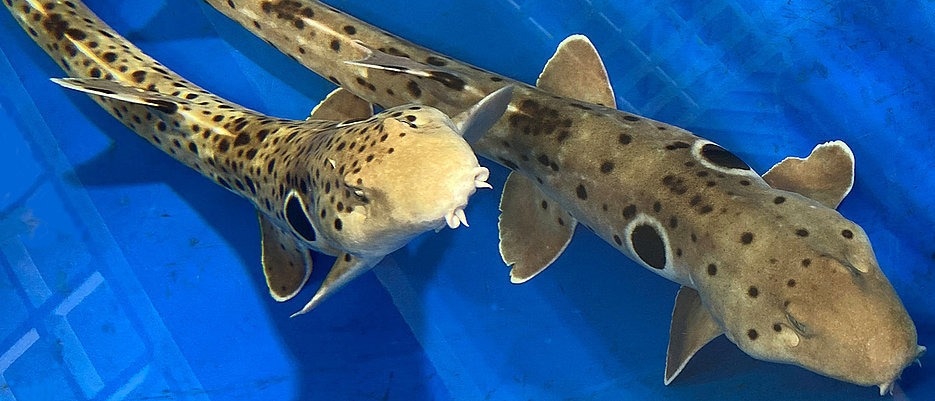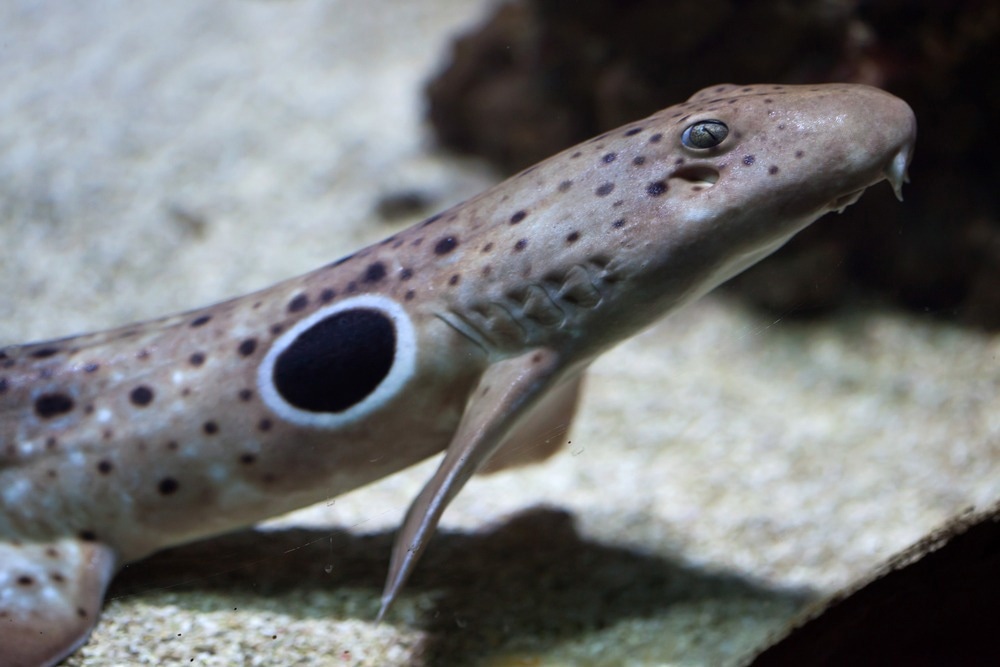Reviewed by Danielle Ellis, B.Sc.Oct 24 2023
Sharks, having thrived for millions of years, exhibit a rare susceptibility to cancer while displaying heightened sensitivity to environmental shifts. A groundbreaking international study, spearheaded by scientists from Würzburg, unveils a genetic basis as a contributing factor.
 The adult pair of epaulette sharks from the study. Image Credit: Frank J. Tulenko.
The adult pair of epaulette sharks from the study. Image Credit: Frank J. Tulenko.
Sharks have been a presence in Earth's oceans for approximately 400 to 500 million years. While the planet and many of its inhabitants have experienced significant transformations over this extended period, this fundamental group of vertebrates has remained remarkably stable.
Their physical form and biological characteristics have undergone minimal alteration during this extended timespan.
An international research collaboration spanning Germany, Australia, Sweden, and the USA has unveiled the explanation behind this remarkable endurance. They have identified that sharks possess the lowest mutation rate between generations ever documented in vertebrates.
This groundbreaking study was spearheaded and coordinated by the research team led by Senior Professor Manfred Schartl at the Department of Developmental Biochemistry at the Julius-Maximilians-Universität Würzburg (JMU)
The study has been currently published in the journal Nature Communications.
Studies on Epaulette Sharks
For this investigation, epaulette sharks were captured off the northeast coast of Australia, and subsequently, a breeding facility was established at the Australian Regenerative Medicine Institute (ARMI) within Monash University.
This groundbreaking development allowed, for the first time, the genetic assessment of mutation rates within a lineage of sharks.
The research team initiated the process by constructing a high-quality reference genome and sequencing the complete genomes of the parent sharks. Subsequently, the genomes of the nine offspring were sequenced to identify new mutations occurring in the descendants.

Image Credit: Vladimir Wrangel/Shutterstock.com
The outcome of this endeavor revealed an estimated mutation rate of 7×10-10 per base pair per generation, which represents the lowest mutation rate ever documented among vertebrates. This rate is 10 to 20 times lower than that observed in mammals.
Low Mutation Rate as a Double-Edged Sword
Sharks have often been noted for their remarkably low cancer incidence.
The low mutation rate could play a decisive role in this.”
Manfred Schartl, Senior Professor, Department of Developmental Biochemistry, Julius-Maximilians-Universität Würzburg
While it may seem like positive information for these creatures, it also introduces certain challenges. Mutations play a critical role by enhancing genetic diversity in populations, facilitating adaptation to novel environments, and driving evolutionary shifts.
Due to the gradual pace of shark evolution, they face the potential vulnerability of being ill-equipped to endure environmental pressures like overfishing and habitat depletion.
Particularly Worthy of Protection
Shark populations across the globe are facing alarming declines, with some species among the approximately 530 known facing acute extinction risks.
These perils primarily arise from habitat alterations, such as ocean warming and unintentional capture in fisheries. Additionally, sharks are subjected to direct hunting, notably for the dubious production of anti-cancer supplements, lacking scientific validity.
Given the pivotal roles sharks play in numerous marine ecosystems, it is imperative to bolster and amplify attempts aimed at safeguarding all shark species and conserving their genetic diversity.
Source:
Journal reference:
Sendell-Price, A. T., et al. (2023) Low mutation rate in epaulette sharks is consistent with a slow rate of evolution in sharks. Nature Communications. doi.org/10.1038/s41467-023-42238-x